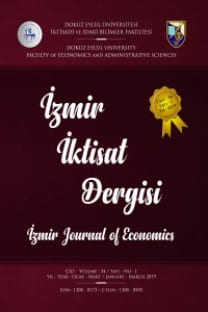MEDENİYETLER ÇATIŞMASI MI, MENFAATLER ÇATIŞMASI MI?
Bu çalışmada “kültür” ve “medeniyet” arasındaki farklılıktan yola çıkarak Huntington’ın Medeniyetler Çatışması tezine bir karşı görüş ortaya konulmaya çalışılmaktadır. Huntington’ın tezinde İslam Dünyası bir tehlike olarak görülmektedir. Oysa İslam Dünyası Batıyı tehdit edecek bir güç değildir. Çünkü günümüz koşullarında bile Batı paradigması geçerlidir ve Doğu, Batı için tehlikeli olabilecek bir paradigma üretimi içinde değildir. Tehlike, Batı’nın kendi içinden kaynaklanmaktadır.
THE POLITICAL OUTCOMES OF GLOBALISATION IN WORLD TRADE: CYPRUS AND IRAQ
There has been a controversy between the theses of “liberalism” and “interventionism” in the history. Although the original aim was liberalism, the final outcome of today’s globalism is the interventionism. Since the theories grounded on the existence of liberalism, interventionism was assumed to be an exceptional circumstance. In today’s terminology, the term of liberalisation is replaced by globalisation. While liberalism base on the grounds of free movement of goods and services, “globalisation” is commonly used to address the ability of free movement of “financial capital”.Trade, in the history, has had a role in shaping countries’ foreign policy. Recent developments in today’s world are the evidence of this fact. The main reason of the USA’s ongoing insistance on the Iraq issue is the accumulation of the rents in the hands of Far East countries. This is due to the fact that the trade activities in the field of Atlantic Ocean reduced, while trade within the Pasific Ocean countries increased. Thus, Europe wishes to approach to trade in the Far East via the Mediterranean and the Middle East. The USA on the other hand tries to control those regions for the same reason. Turkey, here, has an importance arising from her geographical situation.
Keywords:
Globalisation, world trade, international politics, Middle East, Cyprus Iraq.,
- ISSN: 1308-8173
- Yayın Aralığı: Yılda 4 Sayı
- Başlangıç: 1986
- Yayıncı: Dokuz Eylül Üniversitesi İktisadi ve İdari Bilimler Fakültesi
Sayıdaki Diğer Makaleler
TÜRKİYE’DE İTHALAT TALEBİNİN KOENTEGRASYON ANALİZİ: 1987(I)-2000(IV)
MEDENİYETLER ÇATIŞMASI MI, MENFAATLER ÇATIŞMASI MI?
İHRACATA DAYALI-BÜYÜME HİPOTEZİNİN TÜRKİYE EKONOMİSİ VERİLERİ İLE ANALİZİ, 1960–2002
DÖNÜŞÜMCÜ LİDERLİK DUYGUSAL ZEKÂ GEREKTİRİR Mİ? YÖNETİCİLER ÜZERİNDE ÖRNEK BİR ÇALIŞMA
